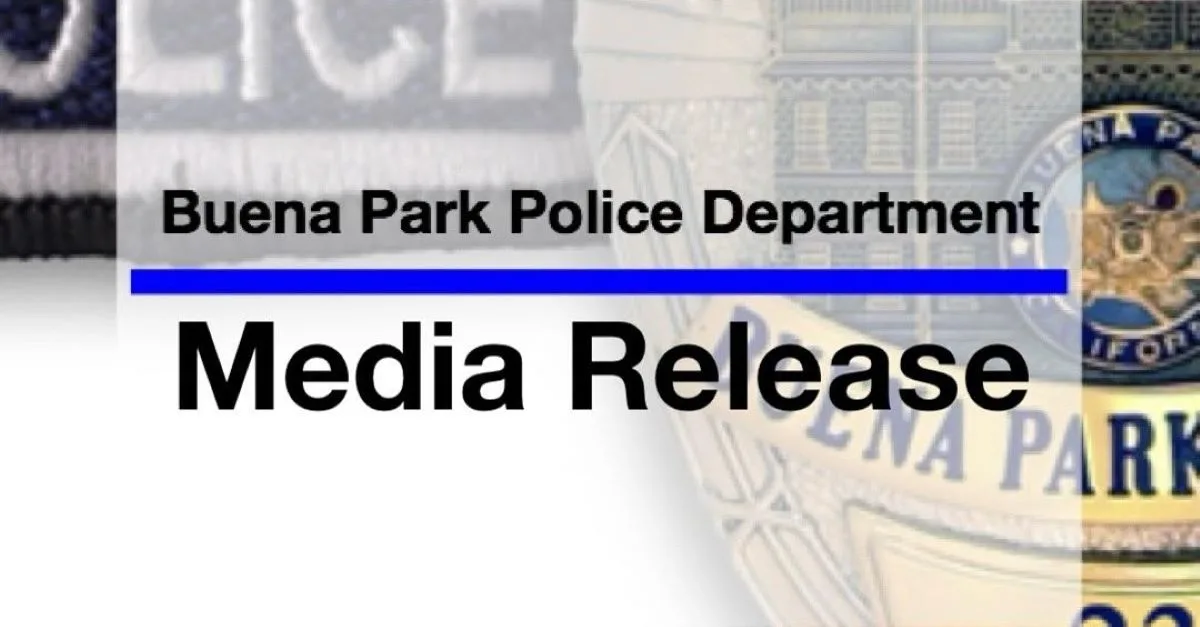The Buena Park Police Department has announced a DUI checkpoint scheduled for Friday, August 8, 2025, running from 7:00 p.m. to 2:00 a.m. at an undisclosed location within the city.
This initiative is part of the department’s ongoing commitment to public safety and its efforts to reduce impaired driving incidents.
According to Sergeant Connor Lee, Traffic Bureau Supervisor, DUI checkpoints are a proven method for identifying and removing impaired drivers from the road. “Driving under the influence—whether from alcohol, prescription medications, or even over-the-counter drugs—poses a serious risk to everyone,” said Sgt. Lee. “Our goal is to prevent tragedies before they happen.”
The department reminds the public that first-time DUI offenders face steep consequences, including fines, legal fees, license suspension, and other penalties. These checkpoints are not only about enforcement but also about education and deterrence.
The checkpoint is supported by the California Office of Traffic Safety (OTS) and the “Sober or Get Pulled Over” campaign, both of which aim to raise awareness about the dangers of impaired driving.
If you’re caught driving under the influence (DUI) at a checkpoint in California in 2025—such as the one planned by the Buena Park Police Department—you could face serious penalties, even for a first-time offense. Here’s a breakdown of what you might expect:
First-Time DUI Offense Penalties in California (2025)
- Fines: Between $390 and $1,000, plus additional penalty assessments that can significantly increase the total cost 1.
- License Suspension: A 6-month suspension by the DMV, and possibly longer if court-ordered 1.
- DUI Education Program: Mandatory enrollment in a 3- to 9-month alcohol education program 1.
- Jail Time: Up to 6 months in county jail, especially if aggravating factors are present (e.g., high BAC, accident, minor in the car) 1.
- Ignition Interlock Device (IID): Required for 6 months if your BAC is 0.15% or higher, or if ordered by a judge due to aggravating circumstances 2.
- Probation: Typically 3 to 5 years of informal probation 2.
- Additional Costs: Legal fees, towing and impound charges, and increased insurance premiums.
Aggravating Factors That Increase Penalties
- BAC over 0.15%
- Minor passenger (under 14 years old) – triggers mandatory 48-hour jail time 2
- Refusal to take a chemical test – leads to automatic 1-year license suspension 1
- Accidents or injuries caused while driving under the influence
These penalties reflect California’s tough stance on impaired driving, especially with the 2025 updates aimed at reducing repeat offenses and increasing public safety.
Getting a DUI in California can have a major impact on your auto insurance, both immediately and for years to come. Here’s what you can expect:
Insurance Premium Increases
- First-time DUI: Your premiums can increase by up to 148%.
- Repeat offenses: Rates may double or triple, depending on your insurer and driving history.
- Average post-DUI annual premiums:
- USAA: $2,751
- Progressive: $2,776
- Geico: $3,451
- Farmers: $3,517
High-Risk Classification
- Insurers will classify you as a high-risk driver, which affects your eligibility for discounts and may limit your coverage options.
- You may lose your “good driver” discount, which can significantly raise your rates.
SR-22 Requirement
- You’ll likely need to file an SR-22, a certificate proving you carry the minimum liability insurance required by California law.
- This form must be maintained for three years, and any lapse in coverage can result in license suspension.
Policy Cancellation or Non-Renewal
- While insurers cannot cancel your policy mid-term, they can refuse to renew it or offer renewal at much higher rates.
Long-Term Effects
- A DUI stays on your DMV record for 10 years, affecting your insurance rates for that entire period 1.
- Most insurers begin reducing rates after 3 to 5 years of clean driving, but full recovery may take longer.
Options for Coverage
- If you struggle to find coverage, you can apply through the California Automobile Assigned Risk Plan (CAARP), which helps high-risk drivers obtain insurance—though often at a steep cost.

